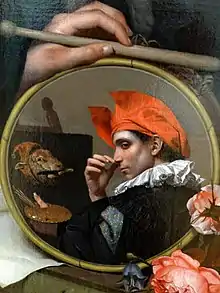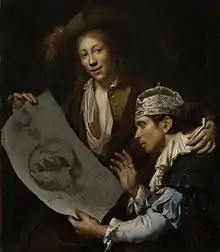Johannes van Wijckersloot
Johannes van Wijckersloot (c. 1625-1630 – 1687) was a Dutch Golden Age painter.
Johannes van Wijckersloot | |
|---|---|
 Self-portrait (detail) | |
| Born | c. 1625-1630 |
| Died | 4 November 1687 (aged 56–62) |
| Nationality | Dutch |
Wijckersloot was born in Utrecht and little is known of his early years, though he probably learned to paint at the newly opened drawing academy there. He worked his way up in the Utrecht Guild of Saint Luke, becoming headman in 1658.[1] He is known for portraits and allegories. His most famous painting is possibly his 1672 allegory of the Rampjaar, in which he painted a representation of the Garden of Holland with a sleeping lion. The motief of the lion in the Garden of Holland became a common symbol in heraldry, asleep or standing victorious with a phrygian cap. Wijckersloot moved to Amsterdam in 1684 where he later died.
 Rampjaar[2]
Rampjaar[2] Dutch coin, 1753
Dutch coin, 1753
References
- Wijckersloot in the RKD
- painting record in the RKD
Wikimedia Commons has media related to Johannes van Wijckersloot.
This article is issued from Wikipedia. The text is licensed under Creative Commons - Attribution - Sharealike. Additional terms may apply for the media files.